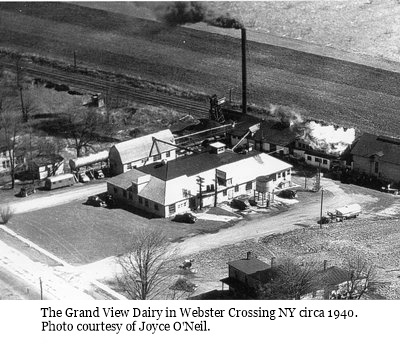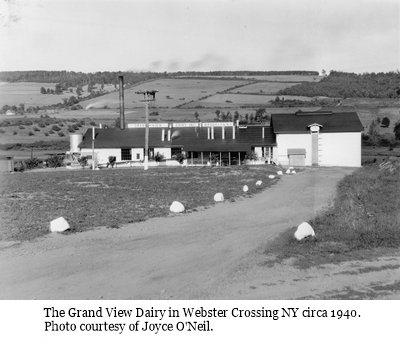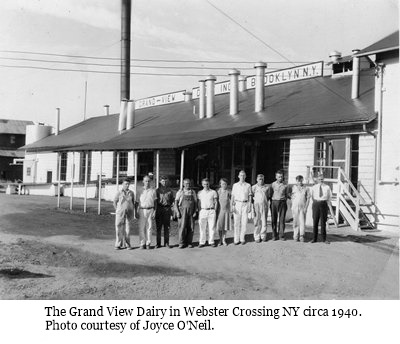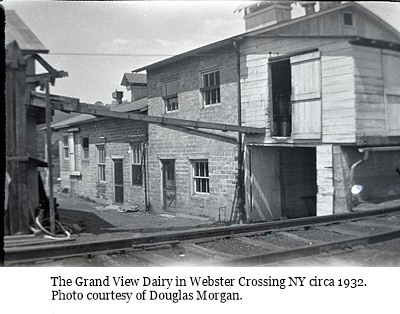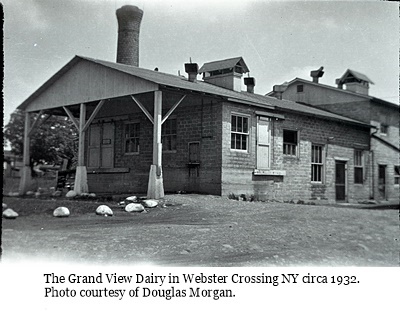
Welcome to Hemlock and Canadice Lakes!
Barns Businesses Cemeteries Churches Clinton & Sullivan Columns Communities Documents Events Time Line Fairs & Festivals Farm & Garden Hiking Homesteads Lake Cottages Lake Scenes Landscapes Library News Articles Old Maps Old Roads & Bridges Organizations People Photo Gallery Podcasts Railroad Reservoir Schools State Forest Veterans Videos
|
Business - The Grand View Dairy of Webster Crossing NY |
Click any image to enlarge. |
|
1 |
This is an aerial view of the Grandview Dairy in Webster Crossing NY. It was a member of the Conesus Milk Producers Cooperative Association. The Cooperative also had associations with dairies in Lakeville, Nunda, Cuba and Prattsburg. Below is a brief history of the Cooperative and the milk producers, dairies, and people who were a part of the organization for all those years. Photo courtesy of Joyce O’Neil. |
|
2 |
Another view of the Grand View Dairy in Webster Crossing NY in the 1940’s. It was a member of the Conesus Milk Producers Cooperative Association. The Cooperative also had associations with dairies in Lakeville, Nunda, Cuba and Prattsburg. Photo courtesy of Joyce O’Neil. |
|
3 |
The people of the Grand View Dairy Webster Crossing NY circa 1940. From left to right are: Burton Perkins, Shorty May, Unknown, Pop Fulford, Ernie Miller, Mildred Pierce, Howard Kern, Arnold Barnhart, Roger Holmes, Paul Perkins, George Rockland. Photo courtesy of Joyce O’Neil. |
|
4 |
A photo of the Grand View Dairy Webster Crossing NY circa 1932. Photo courtesy of Douglas Morgan. |
|
5 |
A photo of the Grand View Dairy Webster Crossing NY circa 1932. Photo courtesy of Douglas Morgan. |
|
The Conesus Milk Producers Cooperative Association, Inc. A General Account of the Operation A Review of the Past Fifty Years 1934 - 1984 By Harold J. Shafer, President The Certificate of Incorporation of Conesus Milk Producers Cooperative Association, Inc. pursuant to Article Eight of the Co-operative Corporations Law of the State was filed in Albany Secretary of State office March 1934. This Co-op, except for the three year period during the war, has always served the New York - New Jersey Federal Milk Marketing order. The Co-op was originally formed because producers in the area were threatened with the loss of the New York market due to a control law initiated by the state at that time. A number of dairy farmers in the area were the organizers. Jay C. Treat was elected its first president; A. G. Walkley, Treasurer and Rensselaer Van Vliet, Secretary. With his understanding of the dairy business and his closeness to the local farmers, Mr. Treat was able to successfully build this powerful organization of area producers. His objective and that of the Conesus Milk Co-op was to “provide the best available market and the best service possible to suit each member.” The board of Directors made an agreement for the leasing of the Grandview Dairy Creamery at Webster Crossing on a monthly basis. There was rapid growth and expansion of the Co-op, and it eventually owned and operated three milk plants. In 1938, the Lakeville plant was purchased from Brown and Bailey. Shortly thereafter, in 1941, the Webster Crossing plant was purchased from the Grandview Dairy Co. In 1943, Conesus purchased a plant located in Nunda from Sheffield Farms Association, Inc. Although Conesus Co-op owned these plants, it did not officially take over the operation of the plants until 1941 when it became a marketing, handling Co-op, whereas previously from its inception until 1941, it had only been a bargaining Co-op. At this time, all the milk which Conesus handled was processed in one of its plants, and any profits which were realized were returned to the producers instead of the individual processors, as had previously been the case. In light of this continual progress, it is not surprising that the Conesus Lake Milk Co-op became the third largest milk Co-op in New York State, and in 1943 served over one thousand members in five counties (Livingston, Monroe, Steuben, Ontario and Genesee) and handled a gross business of more than 1.5 million dollars per year. On January 1, 1944, the management, in keeping with the objective of the Co-op, i.e. to provide the best possible market, withdrew the producers from the New York metropolitan milk market. This decision was reached after careful consideration of several significant factors which arose during the war-time demands on the nation’s agricultural output as a whole, and the New York milk market specifically. Because of heavy military demand, milk for public use became scares. In response to this development, the New York - New Jersey market was expanded to allow cream from western sources to come into the market. This was in direct competition with cream and other dairy products from the area served by Conesus. At the same time, feed subsidy payments to the farmers were lowered significantly to avoid a one cent per quart increase in the retail price of milk. As a result of these developments, producers were leaving Conesus to go to the Rochester market, and there was in general a shadow of dissatisfaction over the producers. It was then that the decision was made to take advantage of the higher prices offered in the south. For the next 3 or 4 years, Conesus shipped its milk to the southern military camps. These years were very prosperous for the Co-op. As the war ended and the military camps gradually phased out of operation, and as the economy returned to peacetime production, the southern markets disappeared. In 1947, the Conesus Lake Milk Co-op resumed its service to the New York - New Jersey market. In 1951, the administrator of order #27 announced that Conesus Co-op pay the administrator’s price of $4.85. Mr. Treat passed away on May 29, 1954. Adolphe Walkley, a local dairyman and an officer of the Co-op since its formation, was named president. He, like Mr. Treat, was knowledgeable, understanding and sympathetic of the dairymen’s problems. It was this background which enabled him to incorporate this “feeling” for the dairymen with the objectives of the Co-op, and as a result, Conesus continued to be a leader in the New York - New Jersey milkshed. An example of Mr. Walkley’s affinity for the cooperative way of doing business can be illustrated by his stand on the bulk milk handling problem, which was not to force bulk mild handling on any producer. The producers could adapt to this new innovation in milk handling as swiftly or as slowly as they liked, or they could reject it altogether. This, Mr. Walkley felt, was one of the services rendered by the Co-op. As the number of farms across the state decreased, so did the number of members belonging to the Co-op. The total area served, however, increased. Three more counties were added, these being Alleghany, Cattaraugus and Orleans, bringing the total to eight. The amount of milk handled also increased. It was a very difficult time for cooperatives, handlers and producers during Mr. Walkley’s term in office as President from 1954 to 1965. In 1954, Conesus Co-op joined Mutual Federation of Cooperatives. Mr. Walkley was elected a director and secretary of Mutual. It was at this time that bulk tank pickup started to increase. In this same year, Conesus Co-op signed a five-year contract to sell its milk to Arkport and Grandview Dairies. Gates Mack, a cornerstone in the organization who was very knowledgeable and involved with milk marketing most of his life, was named General Manager of the Co-op and was responsible for the smooth operation of its business affairs. During the years 1954 and 1960, President Walkley, as Secretary of Mutual Federation, attended many hearings in New York City. He was very influential in decisions that wre made in changes in the different milk orders, state and federal. In 1961, tank trucks were purchased and the plant at Oneida was being built to handle surplus milk. The milk at this point was being sold to Grandview, Charles Cass and Borden Co. In 1964, Mr. Edmund Cook, attorney for the Co-op, retired. He helped form the Co-op from the start and guided it along over many rough spots in the long, winding road. Mr. Cook recommended that Richard Wiles succeed him as attorney. He served until his death in 1981. He too, was recognized as a most capable milk attorney. It was this same year, on September 26, 1964, that President Walkley retired due to ill health. He had been a great help and a courageous leader in the Co-op’s progress. Mr. Walkley passed away in 1975 after a long illness. Mr. Dean Treat, son of Jay Treat, the founder of the Co-op and secretary for several years, was appointed president. In this same year, the merger of Mutual Federation and the Metropolitan Bargaining Agency was formed, the new name being Northeast Federation. Conesus Co-op at that time was the largest single Co-op in the Northeast Federation. Grandview Dairy and Babylon Milk and Cream Companies were purchasing the milk that year. In 1966, on October 1, the Webster Crossing plant was closed, and Grandview Dairy increased its handling charge by two cents for bulk milk to Arkport. It was about this time that complaints were coming from the Department of Health about sewer system in Lakeville and Nunda. In 1968, it was voted on by the membership of the Conesus Co-op to enter into an agreement with Northeast to transfer and sell the Lakeville and Nunda plants, plus the trucks, to Northeast. The plants were to be paid for by issuing Northeast certificates of equity at the rate of five cents per hundred-weight. It was discussed at this time by officials combining milk for a more efficient operation. Milk at this time was $5.71 per hundred-weight. Over the past five years, the excessive cost of changes in the sewer system, the increased cost of transportation and the changes in milk orders and economics made it impossible to continue as an operating Co-op. It was a difficult decision for the manager and directors to make, but it was felt that it was in the best interests of the producers, in protecting their financial interest in Conesus certificates, that we cease being an operating cooperative and close the Lakeville plant. Thus, we became a all-bulk milk cooperative with Northeast handling our milk. So December 31, 1970 closed the history book of Conesus Milk Producers Cooperative as an operating plant, and we became a bargaining cooperative. As Conesus Co-op ceased being an operating cooperative and became a bargaining Co-op, the issuing of Conesus certificates also ended. The Cooperative started issuing certificates to the producers in 1939 for five cents per hundred-weight of milk. These certificates were paid at the end of each four years with interest of 10%. Dean Treat, who had been president since 1965, retired in May 1970 due to ill health. Dean had to make many important decisions during his five-year term as president. Harold Shafer, treasurer for fifteen years and a director since 1946, was named president. Nedco-Northeast handled the Co-op’s mild at Nunda from 1970 until 1975. In 1973, Nedco and Dairylea formed the Common Market Association. On November 15, 1975, The Board of Directors voted to withdraw its affiliation with Nedco. On January 1, 1976, Cuba Cheese and Elmhurst Milk and Cream started hauling Conesus Co-op’s milk to their receiving plants at Cuba and Prattsburg as per contract for five years. Price of milk at this time was $9.05. On January 1, 1976, due to changes in the New York milk marketing order, hauling charges increased fifteen cents per hundred-weight, and transportation differentials increased to 1.5 for each ten miles of hauling further than 201 - 210 mile zone. The milk advertising and promotional referendum came to a vote again and was approved by a large percentage. The support price was raised from 75% of parity to 80% by the Department of Agriculture, taking effect April 1, 1978. The entire Cooperative was saddened by the death of Gates Mack on August 28, 1979. Gates had been General Manager from 1954. He devoted his entire professional capabilities to the best interests of the Conesus Cooperative. Thelma Arnold, bookkeeper in the office for thirty-five years and knowledgeable in the operation of the Cooperative, was appointed General Manager and Assistant Secretary and Treasurer. Thelma knew she had a big job to do following Gates Mack, but she was determined to keep the Co-op going as in the past. Theresa Kellogg, Charlotte Irwin, Grace Holmes and Dorothy Sharpe were very helpful to Thelma in making this changeover. Pat Essler, a field man for Conesus Co-op for forty years, retired on September 1, 1979. Pat was dedicated to his job and was well-liked throughout the milk shed. Roger Rawleigh, who had worked for the Co-op for twenty-five years as truck driver and plant manager at Nunda, was appointed on September 1, 1979 to succeed Pat as field man. On May 2, 1980, Fay Kelly passed away. He was elected a director in 1960, and was appointed by the Board of Directors in 1970 as treasurer. Fay was honest, loyal and dedicated to Conesus Co-op. The Board appointed John Barber to succeed Fay. On August 28, 1980, the office of Conesus Co-op, after serving the business in the old milk plant in Lakeville for forty years, was moved to 65 Big Tree Street, Livonia, New York. This was a welcomed change for all those who worked in the office. Attorney Richard Wiles, successor to Mr. Cook, passed away on April 28, 1981. Mr. Frank Aloi was appointed to succeed Mr. Wiles. Due to an amendment to order #2 of milk marketing, the cost of transportation was increased eleven and twelve cents to Cuba and Prattsburg. The amendment allowed the hauler to charge the producer the total cost of transportation from farm to first place of delivery. This went into effect on September, 1, 1981. The Board of Directors renegotiated a new five-year contract with the sale of milk to Cuba Cheese and Steuben Foods, effective January 1, 1981 through 1985. On February 4, 1982, the Cooperative lost another one of its officers, Mr. Jerome Emerling. Jerry, as we called him, was Second Vice-President and served on the Board of Directors for seven years. His knowledge and advice were highly thought of. The Board of Directors, on May 22, 1982, passed a resolution to pay to the producers three cents per hundred-weight of milk from the Co-op’s earnings during 1981 and 1982. On September 1, 1982, another one of the Co-op’s highly respected field men, Mr. Ken Wolfanger, retired. Ken worked for the Cooperative for forty-four years. He was a dedicated employee and was well-liked by all the producers he served. David Irwin worked with Ken from February 1 until Ken retired. Dave was appointed field man on September 1, 1982 to succeed Ken. A resolution was passed in May 1983 to pay producers three cents per hundred-weight, money to be used form Co-op earnings during 1982 and 1983. The Board of Directors, after debating the issue during several meetings, voted on February 5, 1983 to adopt a stop charge of $4.00 per stop to pick up milk. This is to be part of the cost of transportation. The Board has had to make many important changes during its period of operation. This was a change the Board did not like to make, but due to competition and economics, it was considered in the best interests of the Cooperative. Market Administrator price, $13.35. Carl Riley, a director for thirty-two years and First Vice-President for most of those years, resigned on April 23, 1981. He was named by the Board of Directors as a Director Emeritus. Carl passed away on February 10, 1983. He will always be remembered by those associated with the Co-op for his untiring interest and dedication in working for the Cooperative among the producers in the Southern Tier area. In the fifty years of its existence, Conesus Milk Producers Cooperative has served its members well. The officers and management have dedicated themselves to achieving the best for the producers. An annual increase in the amount of milk handled, as well as a consistent score of 90 and above in U. S. P. H. inspections proves this. Many directors and employees, living and deceased, have contributed years of service to the success of the Cooperative. It was and is a friendly family operation. The future of dairy farming is uncertain, but milk and milk products are still necessities to good health. Conesus Milk Producers Cooperative will continue to strive for the best interests of the dairymen. |
||
